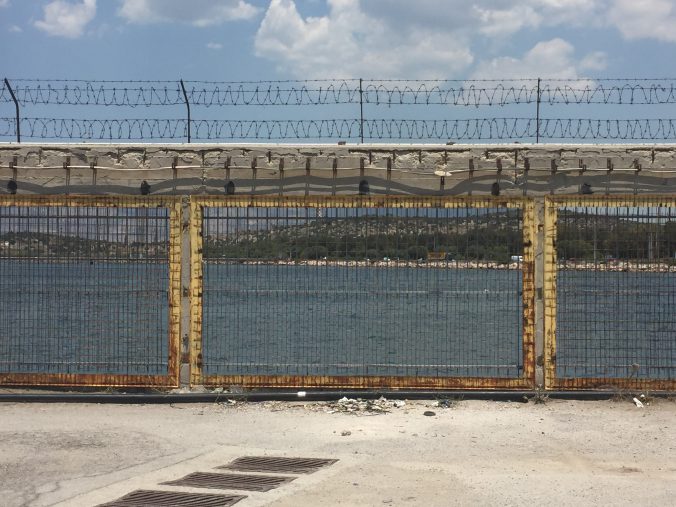By Jack Lohmann
SKARAMAGAS, Greece — At Skaramagas refugee camp, someone has scrawled black numeric codes on the front of each of the hundreds of otherwise identical metal containers that house refugees.
The codes mark each container’s location. Other than an occasional clothesline, few other features distinguish row after row of these mass-produced trailers. At Skaramagas, authorities have hauled in more than 400.
The camp sits on an idle dock near the Port of Piraeus, just outside Athens. On a recent afternoon, water lapped at two sides of the camp, and a sea breeze struggled to cool the midday sun. Blue-purple mountains loomed in the distance.
Inside a stained tent by the water’s edge, an elaborate cluster of speakers blasted music as boys played pool.
Nearby, a group congregated outside a small, shed-like building. In light-blue stenciling, someone had painted “HELP DESK” across its wooden exterior. Inside, aid workers helped people fill out registration papers, tax forms and other documents. Fliers advertised English lessons and other opportunities. A steady stream of refugees made its way inside.
Romal Barakzai stood silently in a corner as two workers reviewed his tax information. Barakzai fled Afghanistan in 2016. Slender and quiet, he proudly shared his resume with a reporter. He wanted to find a job in Athens.
According to his resume, Barakzai speaks five languages and “exemplifies integrity.”
In Kabul, Barakzai worked as a border patrol officer; he later became head coach of a women’s cricket team. Three years ago, his team won entry into the World Cup. “I have not contacted my family in three months,” Barakzai said. He does not own a phone.
On a wall next to an aid worker’s desk, a laminated map offered insight into the place that thousands of displaced people now call home. The map showed a playground, an outdoor gym and a music area. Other buildings — for the Hellenic Navy, the International Red Cross and a “Woman’s Communal Space” — offered a stark reminder of how the world has changed. Novelty and routine intermix; men, women, and children negotiate the difference.
